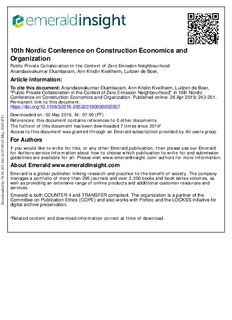| dc.contributor.author | Ekambaram, Anandasivakumar | |
| dc.contributor.author | Kvellheim, Ann Kristin | |
| dc.contributor.author | De Boer, Luitzen | |
| dc.date.accessioned | 2019-07-31T15:46:13Z | |
| dc.date.available | 2019-07-31T15:46:13Z | |
| dc.date.created | 2019-06-13T19:01:41Z | |
| dc.date.issued | 2019 | |
| dc.identifier.isbn | 978-1-83867-051-1 | |
| dc.identifier.uri | http://hdl.handle.net/11250/2606915 | |
| dc.description.abstract | Purpose. This study aims to gain an understanding of success factors and barriers to public private collaboration in the context of zero emission neighbourhood.
Design/Methodology/Approach. Qualitative research method: narrative literature study
Findings. On the basis of the identified success factors and barriers, a model with the following five interconnected themes is developed: (1) supportive public policy, (2) stakeholder management, (3) creation of a common ground for understanding, (4) knowledge sharing and learning and (5) uncertainty management. Research Limitations/Implications – The model can be further developed and tested. In-depth conceptual/empirical study on the five themes can shed more light on the topic.
Practical Implications This model is one of the several ways to understand, structure and simplify the reality (of public private collaboration in the context of zero emission neighbourhood). These five themes are arranged in the model in such a way to represent strategic, tactical and operational levels. This model can be useful to identify measures (steps, concrete actions, etc.) To address issues related to the five themes in a given organisational context. Focusing adequately on these five themes can contribute to successful public private collaboration in the context of zero emission neighbourhoods.
Originality/Value This study/model provides an overall, holistic approach to address/improve public private collaborative endeavours in the context of developing zero emission neighbourhoods. | nb_NO |
| dc.language.iso | eng | nb_NO |
| dc.relation.ispartof | Volume 2 - 10th Nordic Conference on Construction Economics and Organization | |
| dc.relation.ispartof | 10th Nordic Conference on Construction Economics and Organization (CEO 2019) | |
| dc.rights | CC BY 4.0 | * |
| dc.rights.uri | http://creativecommons.org/licences/by/4.0/legalcode | * |
| dc.subject | Zero emission neighbourhood | nb_NO |
| dc.subject | Construction | nb_NO |
| dc.subject | Public private collaboration | nb_NO |
| dc.subject | Energy efficiency | nb_NO |
| dc.subject | Stakeholder management | nb_NO |
| dc.subject | Knowledge sharing | nb_NO |
| dc.subject | Uncertainty management | nb_NO |
| dc.title | Public private collaboration in the context of zero emission neighbourhood | nb_NO |
| dc.type | Chapter | nb_NO |
| dc.type | Conference object | nb_NO |
| dc.type | Peer reviewed | nb_NO |
| dc.description.version | publishedVersion | nb_NO |
| dc.rights.holder | © 2019 Anandasivakumar Ekambaram, Ann Kristin Kvellheim, Luitzen de Boer | nb_NO |
| dc.source.pagenumber | 243-251 | nb_NO |
| dc.identifier.cristin | 1704766 | |
| cristin.unitcode | 7401,30,70,0 | |
| cristin.unitcode | 7401,30,40,0 | |
| cristin.unitname | Mobilitet og samfunnsøkonomi | |
| cristin.unitname | Arkitektur, byggematerialer og konstruksjoner | |
| cristin.ispublished | true | |
| cristin.fulltext | original | |
| cristin.qualitycode | 1 | |

